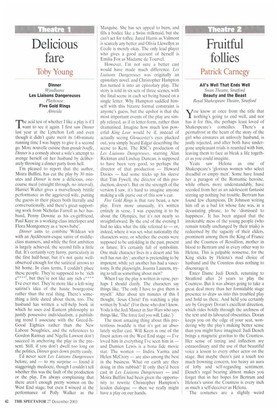Delicious fare
Toby Young
Dinner Wyndhams Les Liaisons Dangereuses Plavhotic Five Gold Rings Almeida
Tie acid test of whether I like a play is if I want to see it again. I first saw Dinner last year at the Lyttelton Loft and even though it didn't quite merit its 140-minute running time I was happy to give it a second go. More nouvelle cuisine than grande bouffe, Dinner is a comedy about a wife's attempt to avenge herself on her husband by deliberately throwing a dinner party from hell.
I'm pleased to report that the author, Moira Buffini, has cut the play by 30 minutes and Dinner is now a delicious, onecourse meal (straight through, no interval). Harriet Walter gives a marvellously brittle performance as the aggrieved wife, putting the guests in their places both literally and conversationally, and there's great supporting work from Nicholas Farrell as her husband, Penny Downie as his ex-girlfriend, Paul Kaye as a working-class interloper and Flora Montgomery as a 'news babe'.
Dinner aims to combine Wildean wit with an Ayckbourn-esque satire of middleclass manners, and while the first ambition is largely achieved, the second falls a little flat. It's certainly very funny, particularly in the first half-hour, but it's not quite wellobserved enough for the satirical arrows to hit home. In class terms, I couldn't place these people. They're supposed to be 'rich c*"*', but they're not like any rich c**** I've ever met. They're more like a left-wing satirist's idea of the haute bourgeoisie rather than the real thing. There's something a little dated about them, too. The husband has written a self-help book in which he uses cod Eastern philosophy to justify possessive individualism, a publishing trend I associate with the Greed-IsGood Eighties rather than the New Labour Noughties, and the references to Gordon Ramsay and Nigella Lawson don't succeed in anchoring the play in the present. Still, if you don't dwell too long on the politics, Dinner goes down pretty easily.
I'd never seen Les Liaisons Dangereuses before, and to my surprise — found it staggeringly mediocre, though I couldn't tell whether this was the fault of the production or the play. I'm always complaining that there aren't enough pretty women on the West End stage, but even I winced at the performance of Polly Walker as the Marquise. She has sex appeal to burn, and fills a bodice like a Swiss milkmaid, but she can't act for toffee. Jared Harris as Valmont is scarcely any better and Olivia Llewellyn as Cecile is merely okay. The only lead player who gives a good account of herself is Emilia Fox as Madame de Tourvel.
However, I'm not sure a better cast would have made much difference. Les Liaisons Dangereuses was originally an epistolary novel, and Christopher Hampton has turned it into an epistolary play. The story is told in six sets of three scenes, with the final scene in each set being based on a single letter. Why Hampton saddled himself with this bizarre formal constraint is anyone's guess, but the upshot is that the most important events of the play are simply relayed, as if in letter-form, rather than dramatised. Imagine how much less powerful King Lear would be if, instead of actually seeing Gloucester's eyes plucked out, you simply heard Edgar describing the scene to Kent. The RSC's production of Les Liaisons Dangereuses, starring Alan Rickman and Lindsay Duncan, is supposed to have been very good, so perhaps the director of that production — Howard Davies — had some tricks up his sleeve that Tim Fywell, the director of this production, doesn't. But on the strength of the version I saw, it's hard to imagine anyone making a silk purse out of this sow's ear.
Five Gold Rings is that rare beast, a new play. Even more unusually, it's written entirely in verse. I was expecting it to be about the Olympics, but it's not nearly so straightforward. By the end of the evening I had no idea what the title referred to — or, indeed, where it was set, what nationality the characters were, or whether the events were supposed to be unfolding in the past, present or future. It's certainly full of symbolism. One male character lives in a desert and 'his well has run dry'; another is pretending to be impotent; while yet another has had a vasectomy. Is the playwright, Joanna Laurens, trying to tell us something about men?
When I say the play is written in verse, perhaps I should clarify. The characters say things like, 'The only I have to give them is myself.' After about ten minutes of this I thought, 'Jesus Christ! I'm watching a play written by Yoda!' (For those who don't know, Yoda is the Jedi Master in Star Wats who says things like, 'The force feel you will. Luke.) The most amazing thing about this pretentious twaddle is that it's got an absolutely stellar cast Will Keen is one of the finest actors on the West End stage — I've loved him in everything I've seen him in — and Damien Lewis is a bona fide movie star, The women Indira Varma and Helen McCrory — are also among the best in the business. What on earth are they doing in this rubbish? If only they'd been cast in Les Liaisons Dangereuses — and Moira Buffini had been given the opportunity to rewrite Christopher Hampton's leaden dialogue — then we really might have a play on our hands.


























































 Previous page
Previous page